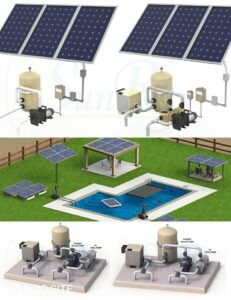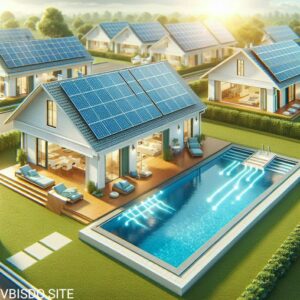Solar pool heating has become a sensible and environmentally friendly substitute for conventional heaters as homeowners and business property managers look for sustainable ways to save energy expenses and environmental effect. Without running rising electricity or gas bills, a pool water heater solar system uses free, renewable solar energy to keep your pool at a suitable temperature.
We will go over solar pool heater operations, advantages, varieties, installation choices, maintenance advice, and if a solar solution is appropriate for your pool in this all-encompassing 2025 guide.
Describe a Solar System for Pool Water Heating
A solar pool heater heats your swimming pool water using the solar energy. Usually, it includes:
-
Usually erected on roofs or close to the pool, solar collectors or panels
-
A pump and filter will help water to pass through the collectors
-
A human or automatically driven flow control valve
After being filtered, cold water from the pool is sent through the solar collectors, where the sun heats it before it is returned to the pool.
Unlike solar systems that heat home water or provide energy, solar pool heaters are designed especially to rapidly and effectively heat vast amounts of water for recreational use.
Advantages of a Solar Pool Water Heater
One Should Start with Notable Energy Savings
Using free solar energy, solar pool heaters can totally or significantly reduce the requirement for gas or electricity. The long-term savings are significant even if the initial outlay may be more. In three to five years most systems pay for themselves.
Two. Environmentally Friendly
Changing to solar will help to lower your carbon footprint and greenhouse gas emissions. Especially crucial as the globe moves toward renewable energy, this is a step toward sustainable, green life.
Third. Extended Summer Swimming Season
Depending on where you live, a solar heater may extend your swim season by four to six months. In hotter climates, you may even swim all year round.
Four. Low Maintenance
Once set up, solar pool heating systems need little upkeep. They often run longer than conventional heaters—up to 15–20 years—because they lack mechanical components or combustion.
Five. Subdued Operation
For both domestic and resort pools, solar heaters are perfect as they run softly unlike gas or electric heaters that may be loud.
How Does Heating a Solar Pool Work?
The approach is simple and effective:
-
The pool’s pump moves water via a filter then through the solar collectors
-
Usually composed of dark-colored, UV-resistant materials, the solar collectors absorb sun heat and warm the water
-
Return: The newly warm water is dumped back into the pool
Some systems feature a controller that monitors temperature and modulates flow to maximize efficiency.
Combining a solar pool heater with a gas or electric backup heater can help you in colder months or on overcast days.
Models of Solar Pool Heaters
Solar pool heating systems mostly fall into two categories:
One Could Say: Unglazed Collectors
-
Formed from plastic or heavy-duty rubber
-
Made for warmer climates’ seasonal use
-
Quite cheap and really effective in moderate to hot conditions
II. Glassed Collectors
-
Designed from glass covering and copper tubing
-
More costly yet ideal for year-round usage in colder areas
-
Provide higher performance and retention of heat in lower temperatures
Are You Right for a Solar Pool Heater?
Think about if solar pool heating might be appropriate for your house by:
-
Climate: Does best in places with constant sunshine. Perfect daily sun exposure is minimum of 4–6 hours
-
Pool use: A solar heater is an excellent purchase if you swim often and want to prolong the swim season
-
Available roof or ground space: Usually equivalent to 50–100% of the surface area of the pool, enough to put the collectors
-
Budget: Although a home system’s initial expenses run between $3,000 and $6,000, its running expenses are almost nothing
Installational Issues
As you build a solar pool heater:
1. System Size
The system should be just sized to meet the capacity of your pool and intended temperature rise. Usually, the collector area needs to be 60–100% of the surface area of the pool.
2. Location of Collection
Designed ideally for a northern hemisphere south-facing roof. Throughout the day, guarantee minimum shadow and maximum sunshine exposure.
3. Expert vs. Handyman
Many times with warranties, professional installation guarantees efficiency and safety. Although they may save expenses, do-it-yourself systems depend on a strong knowledge of solar physics and plumbing.
Ideas for Maintenance
Though solar pool heaters need little upkeep, follow these easy guidelines:
-
Annually check the panels for damage or trash
-
Look for connections’ or pipework leakage
-
Frequent cleanings of filters guarantees best flow
-
To prevent freezing damage—especially for unglazed systems—empty the system in colder areas throughout winter
Financial and Return on Investment Study
| Feature | Electric Heater | Gas Heater | Solar Heater |
|---|---|---|---|
| Upfront cost | $3,000–$6,000 | $1,500–$3,000 | $2,000–$4,500 |
| Monthly running cost | $0–$10 | $200–$400 | $100–$300 |
| Lifetime | 15–20 years | 5–10 years | 5–10 years |
| ROI timeframe | 3–5 years | Constant expenses | 3–5 years |
| Environmental friendliness | Great | Poor | Moderate |
Although the initial cost of a solar pool heater might be more, the total cost of ownership is far less and the return on investment is outstanding.
Solar Covers versus Solar Pool Heater
Solar pool heaters are often confused by some individuals with solar coverings, also referred to as solar blankets. They vary in this way:
| Feature | Solar Pool Heater | Solar Pool Cover |
|---|---|---|
| Function | Actively warms pool water | Preserves current heat and lowers evaporation |
| Mechanism | Solar collectors with a pump system | Passive cover material |
| Cost | $3,000–$6,000 | $50–$300 |
| Efficiency | High | Modulate Efficiency |
Many pool owners use both to maximize efficiency: the heater heats the pool, and the cover stores that heat overnight.
Solar Pool Heating’s Future—2025 and Beyond
Rising energy costs, more environmental rules, and solar technological developments all help to drive demand for solar pool heaters. Already on the market are smart systems combining with home automation and weather prediction.
You should see:
-
Greater efficiency panels
-
Innovative thermostats
-
App-based tracking
-
Hybrid systems for cooler climates
As technology becomes more affordable and efficient, solar pool heating will likely become a standard feature in residential and commercial pools worldwide.

Final Thoughts
A pool water heater solar system is an excellent investment for anybody wishing to save money, enjoy their pool longer, and embrace renewable energy. With cheap running costs, minimum upkeep, and huge environmental advantages, it’s a sensible improvement for both homes and resorts.
Whether you’re developing a new pool or remodeling an old one, solar heating technology in 2025 is more accessible and powerful than ever.
Ready to go solar with your pool heater?
Research local installers, check for incentives, and enjoy a longer, warmer pool season—powered by the sun!
